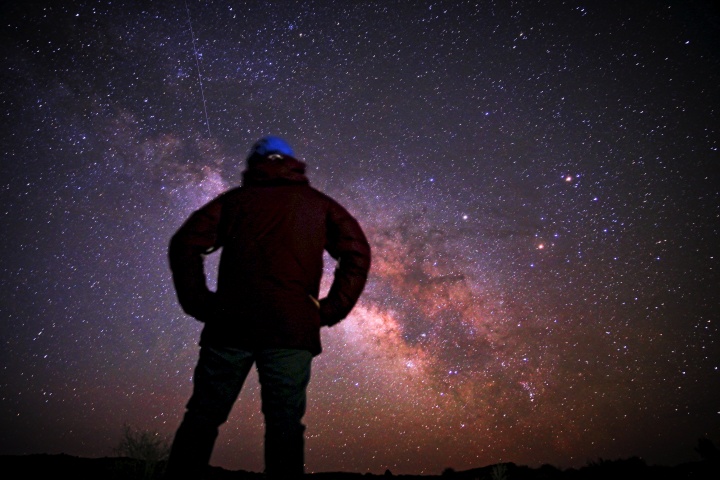What Is Man That You Are Mindful of Him?
Downloads
What Is Man That You Are Mindful of Him?

Copernicus was wrong.
I don’t know how many of you were aware of that, but the heliocentric model that we’ve been taught for so many years is absolutely false; completely made up, outright lies and propaganda.
Nope . . . the Earth revolves around seventh graders.
Hard to believe I know, but it’s true.
Sorry, Copernicus.
This past year, I taught my first seventh grade science class in the nine years that I’ve taught middle school science. As the year progressed, I was surprised to see just how different my seventh graders are from my eighth graders. Realistically, this phenomenon of septemgradocentricity is not isolated to just seventh graders, I just think the change in levels enabled me to see it more clearly. To be perfectly honest, many today struggle with their place in the vastness of this universe.
It’s nothing new. Man has pondered it for millennia.
King David was inspired to write the eighth Psalm during an evening of pondering his place in the universe, and ultimately his importance to God as an infinitely small part of that creation. Within it, in verses 3 and 4 he writes: “When I consider Your heavens, the work of Your fingers, the Moon and the stars, which You have ordained. What is man that You are mindful of him, and the son of man that You visit him?” (Psalm 8:3-4).
Interestingly, however, my seventh graders as a whole haven't pondered it. Most admitted to never even really considering it. Many admitted to never really looking up at all! A recent study details the degree of light pollution occurring around the world today—and it’s no wonder they don’t look up and wonder. How can my students consider something they can’t even see?
As a result of all of this, my goal when I taught their astronomy unit was to make them feel appropriately small. To gain a sense of the vastness and the wonder of the universe—to begin to make them curious about what is up there, and perhaps through that sense of wonder, they’ll eventually begin to ask the real important questions of life. The ones that really matter.
Why am I here? What is my place in all of this?
We are standing on the only habitable rock that we are 100 percent certain actually is habitable. Our rock is rotating at around 1,000 miles per hour on its axis, depending on your location, and revolving at approximately 67,000 miles per hour as it orbits our sun.
But that’s just earth. There are seven other planets in our solar system in motion around the sun as well. Our next neighbor as we move outward, Mars, is a staggering 139 million miles away on average, but it could theoretically come as close as 33 million miles or as far away as 249 million miles. Simply taking a brief look at one of our planetary neighbors allows us to begin to see the staggering scale of the universe itself.
Our sun is one of an estimated 200 billion stars contained within the Milky Way. Our solar system revolves on one of the spiral arms of the galaxy as it travels around the central supermassive black hole, traveling at an estimated rate of 490,000 miles per hour.
The size and scope becomes even more mind boggling as we move outward.
The next closest star to us within that Milky Way cluster, Proxima Centauri, is located 4.234 light years away--so far that it would take a photon of light traveling at 186,000 miles per second 4.234 years to reach it. In miles that looks more like 24.9 trillion miles. 24.9 with 12 zeros, and that is the next closest star of the approximately 200 billion in the Milky Way.
But the Milky Way is only one of an estimated 100 billion galaxies in the entirety of this vast universe. The next closest galaxy to us, Andromeda, is 2.5 million light years away. 186,000 miles per second for 2.5 million years. That’s the next closest cluster of stars and planets outside of our Milky Way, and only one of the 100 billion contained within.
Are you feeling tiny? Insignificant?
Well don’t. Because this was the point of David’s musings so many thousands of years ago. Despite this vast, incredible creation that God has wrought—with all of those planets, stars, solar systems and galaxies spinning in predictable motion, like clockwork so many billions of miles away, He also created mankind.
In the grand scheme of it all, we’re nothing more than a speck of dust, created a little lower than the angels, but we’ve been offered an even greater destiny—eternity as sons and daughters in the Kingdom of God.
What an incredible opportunity!
As God’s plan unfolds, He is bringing many sons and daughters to glory. That plan includes you. He has looked down upon this vast creation; complete with its many galaxies, solar systems and planets and has said: “That one right there. I want that one.” God is offering you a chance to be a part of His family, to be a child of the Most High and to be a part of the coming Kingdom of God.
How can you say no to that?
